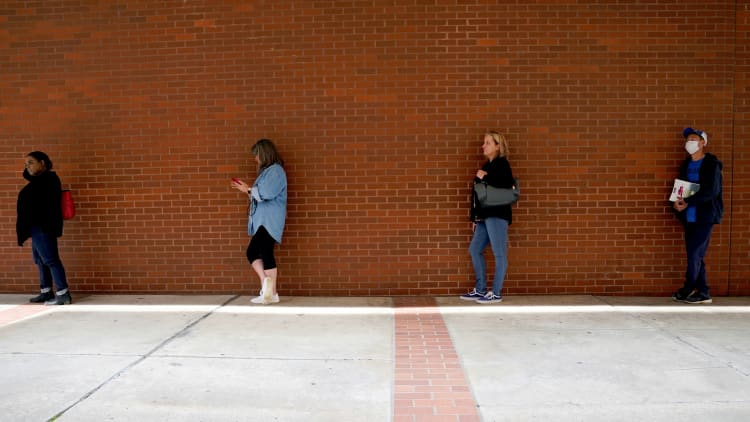
Jobless claims continue to rise.
New claims reached 3.84 million last week, bringing the total to 30.3 million for the last six weeks. The number of total claims makes this the worst unemployment crisis in U.S. history.
Optimistic path to recovery
Eugene Scalia, U.S. Labor secretary, said there is optimism for the path to recovery.
"It's just a very high number but a couple of quick notes about it. One, the president and Congress moved very swiftly in March to address this, including with the unemployment enhancements made in the CARES Act. As of last Tuesday, all 50 states and the District of Columbia are now paying that additional $600 supplement that the president signed off on in the CARES Act. So that's valuable relief that's on the way to states. ... They've got some old computer systems, but we are working with them at the Labor Department to help get these payments out. And then the second point that I do think is important, as difficult as it is to see this many Americans unemployed, we came into this period of unemployment by a very different path than say in the Great Recession, and we'll go out by a different path and there's some reason for optimism there, too."
Reaching a new bottom
Komal Sri-Kumar, president of Sri-Kumar Global Strategies, said there is still more downside in sight.
"Positive impact on the economy is going to take quite some time, not only in the second quarter that Chairman Powell talked about -- the third, fourth quarters are likely to be difficult as well. None of those is figured into equity prices, and that is my concern in terms of looking at ... what investors should be doing at this time. Demand is going to fall off – aggregate demand, demand for consumption, demand for investment goods – are going to fall off much more than investors have given it credit for. Once that is taken into account, I think the equities have a second leg down. And I don't think this is going to be any different than what we saw in the final quarter of 2008, and not bottoming out until the March of 2009. We have a rally, which to me still seems like a bear market rally."
Repair of the consumer psyche
Steve Mollenkopf, CEO of Qualcomm, said the most challenging aspect to recovery is repairing the consumer psyche.
"I think the next phase that business leaders are going to be looking for, is how do we make sure that the psyche of the consumer is repaired as quickly as possible? And I think that's one of the more challenging aspects. I don't have any great idea as to how to do that, but I think that's the thing that will have the biggest impact to business worldwide. It's not so much how they operate internally, but how does the market repair itself? How does the consumer feel comfortable to do many of the things that the broad economy needs for it to be successful?"
'A tale of two cities'
Stephen Weiss, founder and managing partner of Short Hills Capital Partners, said the economy and the market are a "tale of two cities."
"Unquestionably the market should not be where it is; without a doubt. It's a tale of two cities right now. You've got a disastrous economy, with no real signs of improvement, and you've got a market that's had just an amazing move higher. As we see companies cut capex, that's going to filter through the whole economy, but yet, there are some companies that are going to do well."





